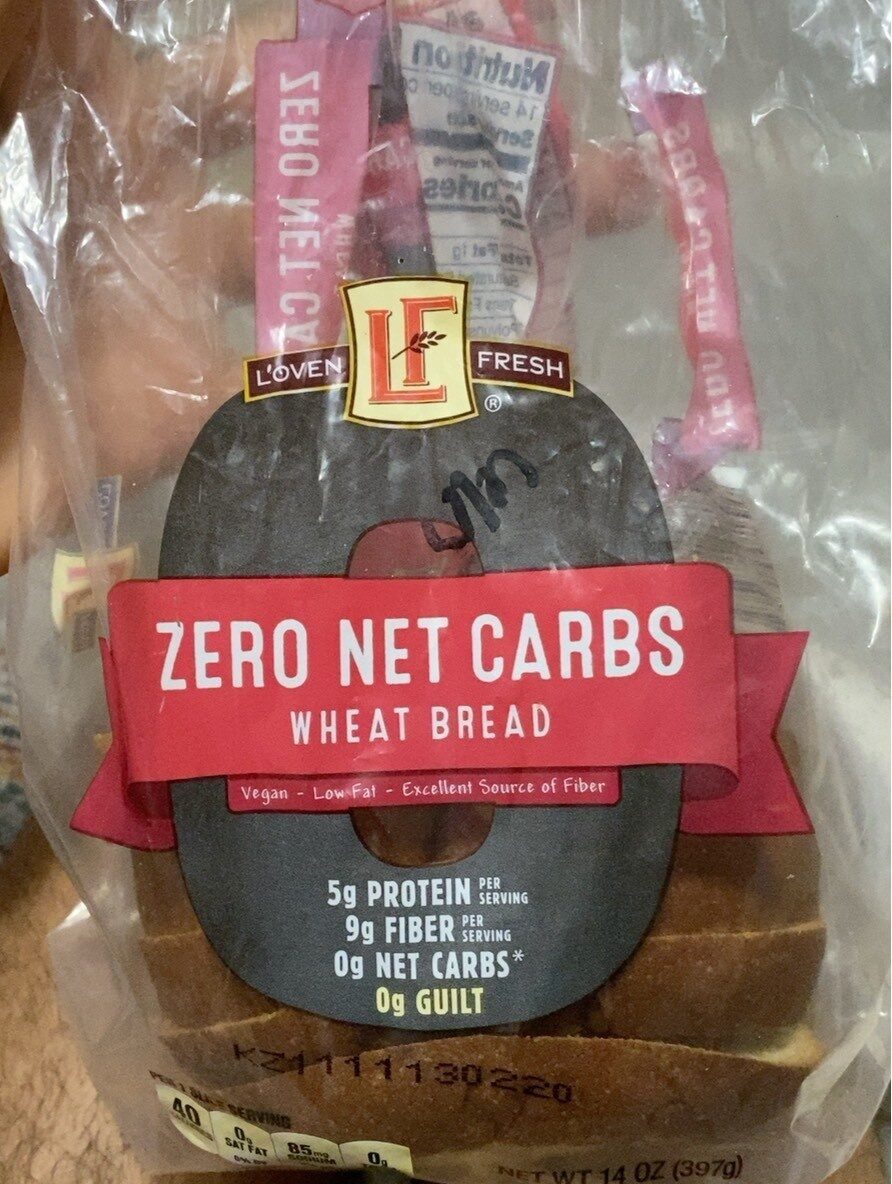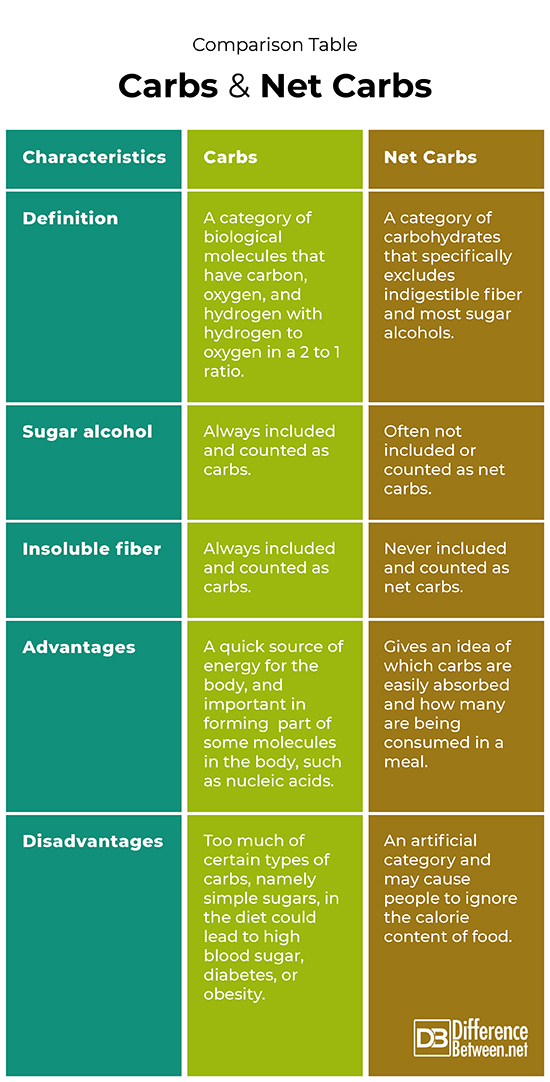Difference Between Carbs and Net Carbs
Carbs include all the types of carbohydrates that have carbon, oxygen, and hydrogen in the molecular structure. Net carbs only include those carbohydrates that nutritionists believe are easily absorbed in the digestive system.

What are Carbs?
Definition:
Carbs are carbohydrates, which are made of atoms of oxygen, carbon, and hydrogen and where the ratio of hydrogen to oxygen atoms is always 2 to 1.
Examples:
Carbs consist of simple and complex sugars. Simple sugars such as glucose and fructose are made of a single monosaccharide molecule; more complex sugar molecules called polysaccharides that include starch and glycogen are made of several simple sugars bonded together. Cellulose which makes up indigestible fiber and sugar alcohols which are natural or synthetically produced, are also types of carbohydrates.
Advantages:
Carbs have many uses in nature and in the human body. Carbohydrates provide a quick source of energy and make up parts of other molecules, for instance ribose and deoxyribose sugars of the nucleic acids of RNA and DNA, respectively. Some carbs that are insoluble and not digestible, namely the indigestible fiber of plant matter, are important in keeping us healthy as they help the digestive system function properly and help lower blood cholesterol.
Disadvantages:
Too many simple sugars such as fructose or glucose in the diet can lead to obesity and also insulin resistance. Insulin resistance can in turn result in type 2 diabetes, a condition that is most common in individuals older than 40, who do not exercise and are overweight.

What are Net carbs?
Definition:
Net carbs is a term used to describe only those carbohydrates that are thought to be easily absorbed in the body.
Examples:
Net carbs is a category that includes glucose, fructose and other carbs that are easily and quickly absorbed in the body, while excluding fiber that is not digested. Sugar alcohols are mainly excluded from net carbs by advocates of low carbohydrate diets.
Advantages:
Using net carbs to plan meals may mean people choose food high in fiber, which is beneficial for health. By controlling the simple sugars such as fructose and sucrose, people may experience less problems with insulin and blood sugar control. This is because too many of these simple type carbs have a high glycemic index, which means they raise blood sugar levels too rapidly. Eating less sugar by watching the net carbs may also mean people lose weight and may be less likely to become overweight.
Disadvantages:
Net carbs are not a food category that is always legally recognized, and this term was mainly developed to promote the idea of low-carb diets and theoretically, to help people intentionally choose low net carb foods so as to reduce eating sugars that quicky raise blood sugar. However, a big drawback is that the idea of exactly what should be excluded from net carbs varies, making it difficult to assess exactly what net carbs mean. The other issue is that people may ignore total calorie count of a food item because the net carbs value for a particular food item is low, which means they may overeat and gain weight. This is because calories also come from other nutrients such as fats and proteins.
Difference between Carbs and Net carbs?
Definition
Carbs are carbohydrates, which are molecules that have carbon, oxygen, and hydrogen with hydrogen to oxygen in a 2 to 1 ratio. Net carbs are carbohydrates but excluding indigestible fiber and most sugar alcohols.
Sugar alcohol
Sugar alcohols are always included and counted as part of carbs. Sugar alcohols are either completely left out or only partly counted as part of net carbs.
Insoluble fiber
Insoluble fiber is always added and included as a type of carbohydrate. Insoluble fiber is never included or considered as being part of the net carbs group.
Advantages
Carbs have many advantages including the fact that they provide a rapid source of energy for the body and are important in forming many molecules in the body, including the sugars of nucleic acids. Net carbs provide an indication of which carbs are easily absorbed and how many are being consumed in a meal, enabling people to eat low carb.
Disadvantages
A disadvantage of carbs is that some are unhealthy in large quantities; in fact, too much simple sugars in the diet could lead to high blood sugar, diabetes, and obesity. A disadvantage of net carbs is that this is an artificial classification of carbs that could cause people to ignore calorie intake, which in turn can also result in people gaining weight.
Table comparing Carbs and Net carbs

Summary of Carbs Vs. Net carbs
- Carbs and net carbs are both categories of carbohydrates.
- Net carbs do not include all types of carbohydrates and always leaves out the fiber.
- Carbs have many important functions in the human body from providing a quick source of energy to forming parts of molecules.
- Net carb values are useful for individuals who are trying to eat low-carb and exclude unhealthy sugars.
- Difference Between Rumination and Regurgitation - June 13, 2024
- Difference Between Pyelectasis and Hydronephrosis - June 4, 2024
- Difference Between Cellulitis and Erysipelas - June 1, 2024
Search DifferenceBetween.net :
Leave a Response
References :
[0]Benalt, Wendi A. "" Net Carbs": The Lowdown on Low-carb Labeling." Nutrition Bytes 10.1 (2005).
[1]Davidson, Eugene A. ”Carbohydrate” Science. Encyclopedia Britannica, 2021. https://www.britannica.com/science/carbohydrate
[2]Minich, Deanna. "Position Paper on Net Carbs." (2004).
[3]Image credit: https://static.openfoodfacts.org/images/products/400/839/100/3675/front_fr.4.full.jpg
[4]Image credit: https://static.openfoodfacts.org/images/products/409/910/018/5072/front_en.9.full.jpg
